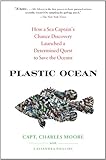 Moby-Duck: The True Story of 28,800 Bath Toys Lost at Sea by Donovan Hohn
Moby-Duck: The True Story of 28,800 Bath Toys Lost at Sea by Donovan HohnMy rating: 3 of 5 stars
During a winter storm in the Pacific Ocean thousands of toy ducks fell off a ship transporting them to the United States from a factory in Asia. What happened next? It turns out the answer to that question is a little bit complicated.
You may find a clue in the book's full title, Moby-duck: the true story of 28,800 bath toys lost at sea and of the beachcombers, oceanographers, environmentalists, and fools, including the author, who went in search of them. Author Donovan Hohn embarks on a mission to find out where these ducks ended up, and what it all means for our oceans and for life in the twenty-first century. If you look at this as the story of the ducks alone you might find yourself lost among the waves of information flowing your way. But if you look at the ducks as a gateway to information on ecology, oceanography, pollution, the ocean-bound shipping industry, toy manufacturing, the economy, and even childhood and children's literature, then you'll have smooth sailing.
 If you'd like a slightly less quirky take on the subject matter, try Plastic ocean : how a sea captain's chance discovery launched a determined quest to save the oceans by Capt. Charles Moore and Cassandra Phillips. This book examines the Great Pacific Garbage Patch, also featured in Moby-Duck, which is called "the largest garbage dump on the planet." You may also be interested in the voyage of the Plastiki, a vessel floating on 12, 500 plastic bottles. You can read all about the journey, and the lessons learned, in Plastiki, Across the Pacific on Plastic: An Adventure to Save Our Oceans
If you'd like a slightly less quirky take on the subject matter, try Plastic ocean : how a sea captain's chance discovery launched a determined quest to save the oceans by Capt. Charles Moore and Cassandra Phillips. This book examines the Great Pacific Garbage Patch, also featured in Moby-Duck, which is called "the largest garbage dump on the planet." You may also be interested in the voyage of the Plastiki, a vessel floating on 12, 500 plastic bottles. You can read all about the journey, and the lessons learned, in Plastiki, Across the Pacific on Plastic: An Adventure to Save Our Oceans If, on the other hand, you're more interested in what's below the waves, try Kraken: the curious, exciting, and slightly disturbing science of squid by Wendy Williams. A journey through the wonderful world of cephalopods, this book is chock full of interesting factoids and fascinating science. Do you know why squids have blue blood? Do you know how an octopus changes its skin color? You can find out inside the pages of Kraken.
If, on the other hand, you're more interested in what's below the waves, try Kraken: the curious, exciting, and slightly disturbing science of squid by Wendy Williams. A journey through the wonderful world of cephalopods, this book is chock full of interesting factoids and fascinating science. Do you know why squids have blue blood? Do you know how an octopus changes its skin color? You can find out inside the pages of Kraken.
And if you want to know how to refer to more than one octopus, watch this video.
Review by Danny Hanbery

octopodes!
ReplyDeleteI have always been captivated by the Bathtub Toy incident. Maybe its the hope that one day I will find a rubber ducky by the sea. Sigh... Anywho, if you are looking for a shortened and less complicated version I would suggest Ducky by Eve Bunting. It has great illustrations and is told from the a rubber duckys perspective.
ReplyDelete